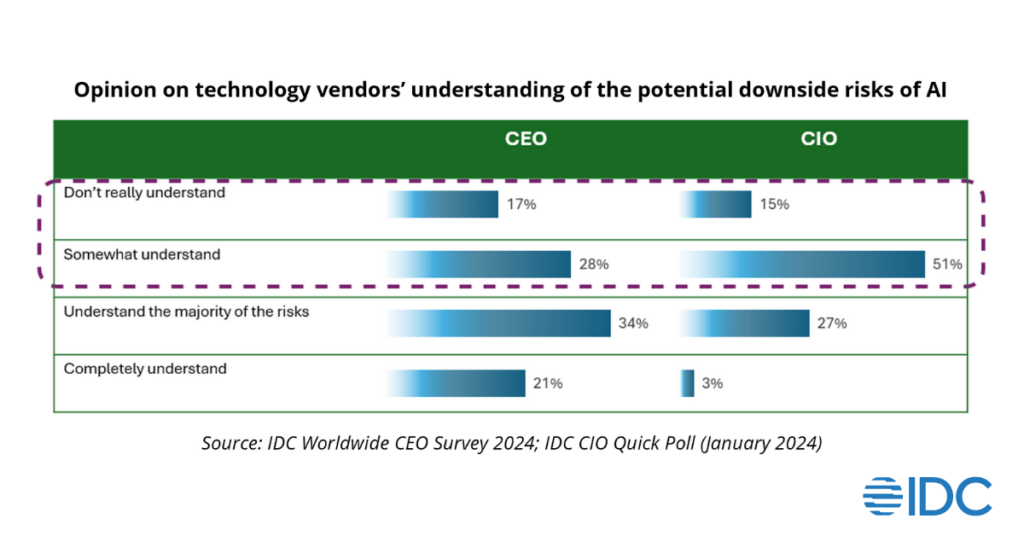With companies across industries and regions jumping on the AI bandwagon, AI – including GenAI – has gained a lot of steam in the past few years. However, CEOs and CIOs express low confidence in the maturity of the technology provider community in understanding the risks associated with AI usage.
IDC CEO Survey 2024 shows that a little less than half of the 354 CEO (45%) surveyed feel that technology vendors do not completely understand the downside risk potential of AI. This sentiment was echoed by about two-thirds of the CIOs surveyed as part of IDC’s recent CIO Quick Poll, which was conducted in January 2024.

Downside risk potential is defined as the likelihood of negative outcomes or adverse consequences associated with a particular decision or investment. In terms of AI, this translates into the following key risk categories:
- Security and data related risks – Cybersecurity threats and data breaches are risks associated with AI, especially in instances where the models have access to sensitive company data and customer’s personal data.
- Environmental and social impact – While the high energy consumption of AI systems can potentially harm the environment by way of increased carbon emissions, large-scale automation of business processes can reduce the need for human intervention in some functions and industries, resulting in higher rate of unemployment.
- Governance – Having a foundational AI governance framework to regulate the use of AI is essential as the lack of understanding and transparency into how AI algorithms are developed and how the models evolve over time can raise concerns around data bias and exploitation. There have also been cases of hallucinations, which have prompted questions around the credibility and accountability of AI in business decision-making. Similarly, instances of reidentification attacks on anonymized personal data have sparked conversations around the ethical aspect of using AI on sensitive and confidential data.
With widespread adoption of AI across multiple business functions and use-cases, the need to identify risks and devise effective strategies and programs to address them has emerged as a critical business requirement. In fact, CEOs surveyed in 2024 cited improving the organization’s risk management posture as the second biggest priority this year.
In the absence of a comprehensive risk mitigation strategy, organizations will struggle to reap the true benefits of AI and leverage it confidently to inform their business decisions. In such a scenario, technology providers can play a pivotal role to support and guide their efforts. But first, they will need to build credibility as experts and trusted AI advisors by focusing on the following critical factors:
- Transparency – By building transparency in how AI models are trained and providing information on data processing & storage, vendors can boost confidence in their solutions. Reducing opaqueness of the AI system’s operations will also help address concerns around data bias and discrimination.
- Trust – Focusing on explainability of the AI model’s decision-making process is necessary to establish trust in the system’s output and boost customer’s confidence to leverage it for business decision-making.
- Compliance – Another critical aspect to consider is the technology supplier’s adherence to prevalent data security and privacy regulations, as well as ESG mandates. This will not only address the requirement for regulatory compliance, but also reflect the vendor’s commitment towards promoting societal well-being and responsible use of AI.
AI has captured the attention of CEOs and the entire C-suite in enterprises. AI offers great potential for fostering automation and innovation. However, being in its early stages, it also brings risks and challenges that are still being explored by the industry.
Organizations looking to adopt AI stand to gain by collaborating with technology providers and leveraging their deep industry knowledge and technical expertise to demystify the challenges and effectively address them. Technology providers must commit to building customer trust by enhancing the transparency of their systems and ensuring adherence to prevalent regulatory standards and mandates.
For more information on the CEO Tech Survey, register for IDC’s webinar “CEO Perspectives: Leading in the Age of AI Everywhere”, Wednesday, April 10 at 12 pm EDT.
Don’t miss this opportunity to stay ahead of the curve and make informed IT decisions.




